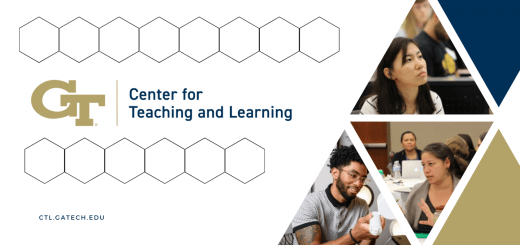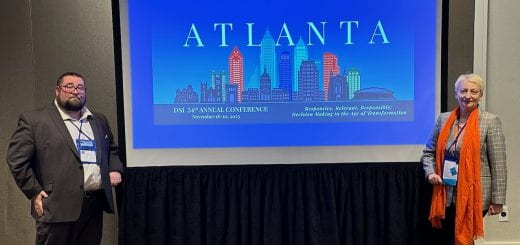Announcing the 2024-25 Provost Teaching and Learning Initiatives

The Center for Teaching and Learning is excited to announce the nine inaugural Provost Teaching and Learning Initiatives. These funded initiatives represent a range of topics that address the discipline-specific priority needs of all seven colleges at Georgia Tech. Each initiative is led by faculty with significant experience in teaching and learning along with support from a CTL Liaison; see below for the full list of 2024-25 initiatives.
 Redesign of 3D Modeling and Rendering Core Courses in the ID Curriculum
Redesign of 3D Modeling and Rendering Core Courses in the ID Curriculum
Tim Purdy, Industrial Design
College of Design
Ameya Sawadkar, CTL Liaison
The School of Industrial Design (SoID) is looking to redesign the 3D modeling, rendering, and animation courses taught during the Sophomore year. With the challenges of increased enrollment, changing technology, a more demanding industry, and more knowledgeable students, SoID plans to create a new robust and flexible curriculum to meet these challenges.
 Subjective Well-being in Design Education
Subjective Well-being in Design Education
Leandro Miletto Tonetto, Industrial Design
College of Design
Sarah Kegley and Carol Subiño Sullivan, CTL Liaisons
“Well-being in Design Education” is an initiative that aims to support students’ subjective well-being by involving the community in co-designing ‘good practices’ to achieve that goal. In doing so, this initiative hopes to embrace the integration of the arts into their pedagogy. They will implement and assess these practices in a specialized elective course in the spring and share their insights through a “good practices” guidebook.
 Cornerstone to Capstone Design: Peer Mentorship in Engineering Design Education
Cornerstone to Capstone Design: Peer Mentorship in Engineering Design Education
Raghuram Pucha, Amit Jariwala, and Jonathan Gaines, Mechanical Engineering
College of Engineering
Kate Williams, CTL Liaison
This initiative will strengthen the engineering design sequence curriculum through development of a peer mentorship program that connects students from the ME1670 Freshman Design class and the senior year ME4182 Capstone Design class. This initiative will leverage the Woodruff Connect platform to embed incentives for graduate students to participate, track participation, and serve as bridges between first-year and final-year students. This initiative, with simultaneous curricular interventions in freshman and senior capstone design courses, lays the foundation for a longitudinal study to further understand the impact of peer mentorship on increasing student retention in the design/manufacturing track at the School of Mechanical Engineering.

 Integrating AI Literacy into GT Writing and Communication Courses
Integrating AI Literacy into GT Writing and Communication Courses
Andy Frazee and Dori Coblentz, Literature, Media, and Communication
Ivan Allen College of Liberal Arts
Lauren Barbeau, CTL Liaison
“Integrating AI Literacy into Writing and Communication Program (WCP) Courses” seeks to incorporate AI literacy in first-year composition and technical/professional communication courses. Using community-of-practice and train-the-trainers models, this initiative seeks to equip students with critical skills for ethical AI use in academic and professional contexts while supporting WCP faculty in innovative teaching practices.
 TechWrites: Developing Writing Pedagogy Across Campus to Enhance the Undergraduate Experience
TechWrites: Developing Writing Pedagogy Across Campus to Enhance the Undergraduate Experience
Melissa Ianetta and Caitlin Kelly, Literature, Media, and Communication
Ivan Allen College of Liberal Arts
Laura Carruth and David Lawrence, CTL Liaisons
“TechWrites” is a yearlong initiative designed to empower instructional faculty with tools and strategies to elevate student writing across Georgia Tech’s diverse learning environments. Programming includes 90-minute workshops addressing the most pressing writing-related classroom challenges and the “TechWrites Institute,” an intensive two-day professional development experience that supports integrating advanced writing strategies into course planning across disciplines. With additional support from the Office of Undergraduate Education, spring programming will feature a lecture and workshop from Neal Lerner, Professor of English at Northeastern University and coauthor of Learning to Communicate in Science and Engineering: Case Studies from MIT.
Reflective Teaching Practices to Promote Students’ Rightful Presence
Meltem Alemdar, Justina Jackson, Jayma Koval, and Katherine King, CEISMC
College of Lifetime Learning
Karen Franklin, CTL Liaison
This project seeks to build GT instructors’ agency and critical consciousness through individual reflection and collective group study grounded in culturally relevant pedagogy and rightful presence. They will utilize reflective teaching strategies to facilitate Georgia Tech Transition Seminar instructors to systematically examine their instructional practices toward greater student learning, belonging, and well-being.

Integrating Generative AIs in Quantitative Courses
Tatiana Rudchenko
Scheller College of Business
Vincent Spezzo, CTL Liaison
“Integrating Generative AIs in Quantitative Courses” focuses on incorporating advanced AI tools like ChatGPT into the MGT 2250, ECON 2250, and MGT 2255 courses at Georgia Tech. This initiative aims to enhance student learning by combining traditional quantitative analysis with cutting-edge AI technologies, preparing students for the evolving demands of the modern business environment. The project also explores the pedagogical impact of AI in fostering deeper understanding and practical skills.

 Beyond Binary Instructional Modalities: Establishing the High Impact of Technology-Enhanced Blended Course Design
Beyond Binary Instructional Modalities: Establishing the High Impact of Technology-Enhanced Blended Course Design
Pamela Pollet, Chemistry and Biochemistry, and Matthew Nusnbaum, Biological Sciences/Neuroscience
College of Sciences
Rebecca Watts Hull, CTL Liaison
Through this initiative, the College of Sciences is addressing the strain on instructional capacity and classroom space by developing blended courses that combine in-person and asynchronous components. This initiative aims to support student success by offering more flexible learning options, fostering a sense of community, and enhancing engagement through high-impact practices like problem-based learning.

 Integrating AI-Driven Collaborative Learning Tools in High Enrollment Computer Science Courses
Integrating AI-Driven Collaborative Learning Tools in High Enrollment Computer Science Courses
Nimisha Roy and Rodrigo Borela, Computing Instruction
College of Computing
Amanda Nolen, CTL Liaison
“Integrating AI-Driven Collaborative Learning Tools in High Enrollment Computer Science Courses” aims to develop a personalized AI-driven platform to provide targeted, early interventions for students in high-enrollment computer science courses. By leveraging adaptive learning technologies, the platform will support diverse student needs, enhance retention, and improve academic performance across the curriculum.
About the Initiatives
The Office of the Provost made up to $30,000 available to each college to support one or more initiatives. Initiatives will be presented to the Georgia Tech community at Celebrating Teaching Day in March 2025 and posted to the CTL Project Showcase. For any questions about the Provost Teaching and Learning Initiatives program, please contact Dr. Carol Subiño Sullivan at csubino@gatech.edu.











